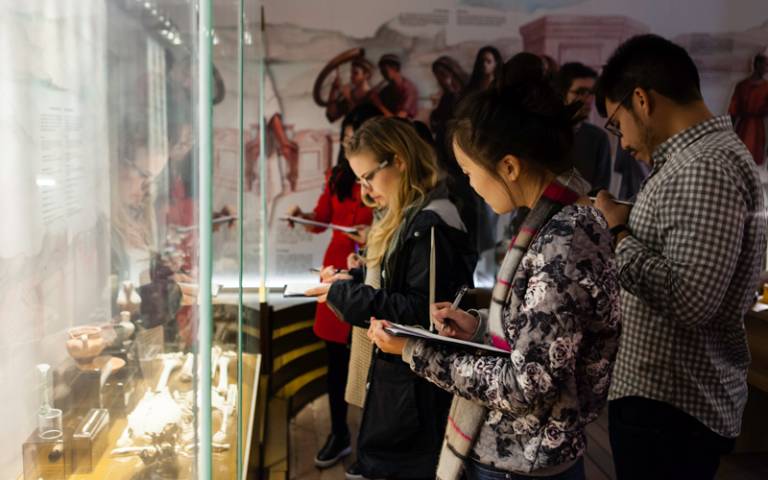Student research showcase - Sustainable Heritage MSc
29 November 2019
Reviving traditional crafts, gentrification in historic cities and more. Discover the latest research topics developed by our MSc students.

We recently hosted an evening of presentations that capture the range of research developed by our Sustainable Heritage MSc students, responding to topics related to the latest conservation policies, methodologies and practices in the context of historic buildings, sites, landscapes and collections.
Presentations covered strategies for reviving traditional crafts, gentrification in historic cities or statutory heritage consultation in planning processes, among other heritage-related topics. We take pride on delivering research-informed teaching that is reflected in the outstanding work done by our students. We're pleased to be able to share with you videos of the presentations below.
Watch the presentations:
- Factors Affecting Integrated Pest Management in Heritage Establishments - Alex Rowe
- Adaptive Reuse: is it Related to Gentrification? - Vanessa Orellana Gutierrez
- Impact of Statutory Consultation Procedure in the English Planning System: A Study of the Role of The Gardens Trust - Siew Jing Ting
- The Revival of Traditional Craftsmanship Supported by Conservation Projects: Is It Sustainable? - Putri Melati
Factors Affecting Integrated Pest Management in Heritage Establishments
Alex RoweYouTube Widget Placeholderhttps://www.youtube.com/watch?v=ktF7gX5X5CM&feature=youtu.be This research investigates the factors affecting IPM schemes in heritage establishments, first identifying them through a literary analysis of IPM publications, and then interviews with heritage professionals in direct contact with schemes.The six factors identified were:
1. Integration and collaboration;
2. Communication;
3. Training;
4. Staff engagement;
5. Heritage context;
6. Resources.The factor found to have the largest influence over IPM was heritage context. These findings mostly pertained to building type, use, location and climate, which seemed to increase the obstacles and challenges to negotiate when trying to best control pests. Due to the limited sample size, the abstractions from this data cannot be generalised to larger populations of heritage employees. However, as there is a sincere lack of criticism of IPM in heritage literature, this paper hopes to provide the basis for understanding the factors most frequently encountered when troubleshooting IPM schemes, to be explored further in future research.
Adaptive Reuse: is it Related to Gentrification?
Vanessa Orellana GutierrezYouTube Widget Placeholderhttps://youtu.be/IYPiUQiFdWc This research aims to develop a major understanding of the interrelation between these two concepts within heritage areas. It is intended to recognize the aspects that led to adaptive reuse and gentrification as individual processes, to analyse the aspects that can contribute to its correlation, to analyse a case study and to describe the impacts identified, according to the data obtained and analysed. The case study, Plaza San Francisco, in Cuenca Ecuador, offers a fruitful scenario where Adaptive Reuse as its decision-making process and actors can be analyzed.Impact of Statutory Consultation Procedure in the English Planning System: A Study of the Role of The Gardens Trust
Siew Jing TingYouTube Widget Placeholderhttps://youtu.be/lDn7HQGr9z4 From the perspective of The Gardens Trust as a statutory consultee, this research identifies the efficiency and level of impact of planning consultation policies on planning applications involving historic parks and gardens by analysing the performance of the Trust in planning consultation process as well as evaluating comments and decisions on planning applications. Focussing on four counties (Hertfordshire, Devon, Gloucestershire and Derbyshire), the findings confirm a degree of ignorance among local planning authorities and reveal multiple issues in the current planning consultation procedure.The Revival of Traditional Craftsmanship Supported by Conservation Projects: Is It Sustainable?
Putri MelatiYouTube Widget Placeholderhttps://youtu.be/8Onml3_HmPU Aiming to explore the sustainability of the revival of endangered traditional building crafts that is particularly driven by conservation projects, this dissertation used qualitative methods through literature review and interviews for data collections. Using a case study of encaustic tiles in the Palace of Westminster, the findings showed that conservation projects play a vital role in the sustainability of traditional building crafts. However, the continuity of the conservation project itself still cannot be ascertained as heritage industry in general highly depends on the broader economic situation.
 Close
Close

